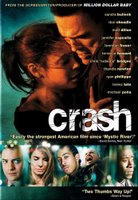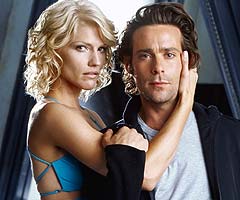Where were we? Ah, December 2004. I had a manager, one who was excited about my script, but who was forced upon me through contractual obligation. He wanted me to rewrite it a little—add a little story beat here, streamline a little there—but he was excited to spec it.
So I rewrote. I agreed with some of their notes, and disagreed with others…and since no one had paid me for it yet, it was still mine and I wasn’t gonna sabotage my own work unless someone backed up the money truck first. In January 2005, I went to LA on weekly- entertainment-magazine business (inasmuch as it’s “business” when I travel: I was covering a crappy Martial Arts Expo that neither Wesley Snipes, Chuck Norris, nor Steven Seagal—all invited guests, mind you—bothered to show for) so I met the Manager, dropped off the rewrite, soaked up some of the “totally stoked to be in the Marc Bernardin business” love, and went home.
A week later, the Manager dropped me as a client.
As it was explained to me, while my rewrite fixed what little there was to be fixed (his words, not mine), he had a very abrupt change of heart regarding
Hero Unlimited’s prospects. He just didn’t think he could sell it. And because he couldn’t sell it, he wanted nothing to do with me.
Now, I knew that
Hero probably wouldn’t sell. Because it’s a hard thing for a studio executive to wrap their minds’ around.
Hero is funny, but it’s not a comedy; the cast eventually travels on a spaceship, but it’s not the future; it’s science fiction, but without any lasers. And it would be expensive (though not as expensive as they’d think). I was under no illusions that I’d wake up and be Shane Black, cashing seven-figure checks and becoming the darling of Hollywood. I was in it for the meetings.
When a script hits the town, and people seem to have some genuinely positive response to it, whether it sells or not, the development execs will want to meet you. Because that’s what they do: have meetings. Meetings for D-girls and boys are like billable hours for lawyers: It’s how they prove they’re doing their jobs.
All I wanted was to get in the room with people and let them see my face, get to know, in 30 minutes, that I’m not a schmuck. And the Manager didn’t even want to get me those meetings. He didn’t really want to develop me as a client, he just wanted to sell my script and get his 10%. Which I understand, but was still disappointed by.
So we parted ways. I was free of any contractual mumbo jumbo. And, in the span of a month, I went from having two literary managers trying to represent me to having none.
Luckily, Circle of Confusion meant it when they said they wanted to be in "the Marc Bernardin business." They took me back and, after another rewrite, sent the script out...and got me the meetings. (No, it didn't sell. I know this because I'm not driving a Boxster.)
I spent a week shuttling from studio lot to studio lot, meeting, greeting, and doing lots of valuable market research. It was explained to me, very early on during Meeting Week, that no one was gonna buy a pitch from me, an unproduced, untested writer, unless it was the idea equivalent of sliced bread...that also gave blow jobs. But they would listen to those ideas, and I should use that time to see which ones got the best response and use that info to help decide what to write next.
(A little aside: The best moment of Meeting Week was on the Universal lot. I was sitting in my car, a little early for my meeting with a DreamWorks exec, when I saw the Universal Tour tram come rolling by. And, as they were passing the production company bungalows, the Tour Guide said, over the loud speakers, "Thousands of screenplays come to Universal every year. Of them, only about a hundred are bought. And of those, only 10 get made into motion pictures. I wouldn't want those odds... Am I right?" Nothing like a little reality-shot-to-the-nads to warm you up before a pitch meeting.)
So, that's what we did, Adam and I. Collated our notes, settled on the idea that got the best response in the room, and went to work. For three weeks, and then put it on the back-burner so we could devote three months to writing a comic book.
And that's the end of the
Hero journey. I've still got it, sitting on my hard drive, waiting for the adventurous studio exec to take a chance. But, I've gotta tell you, I wouldn't have written it had John Rogers not dangled the
Global Frequency carrot. So, for that, I am eternally grateful. He'll get a shout-out when I win an Oscar. Or a Razzie.





